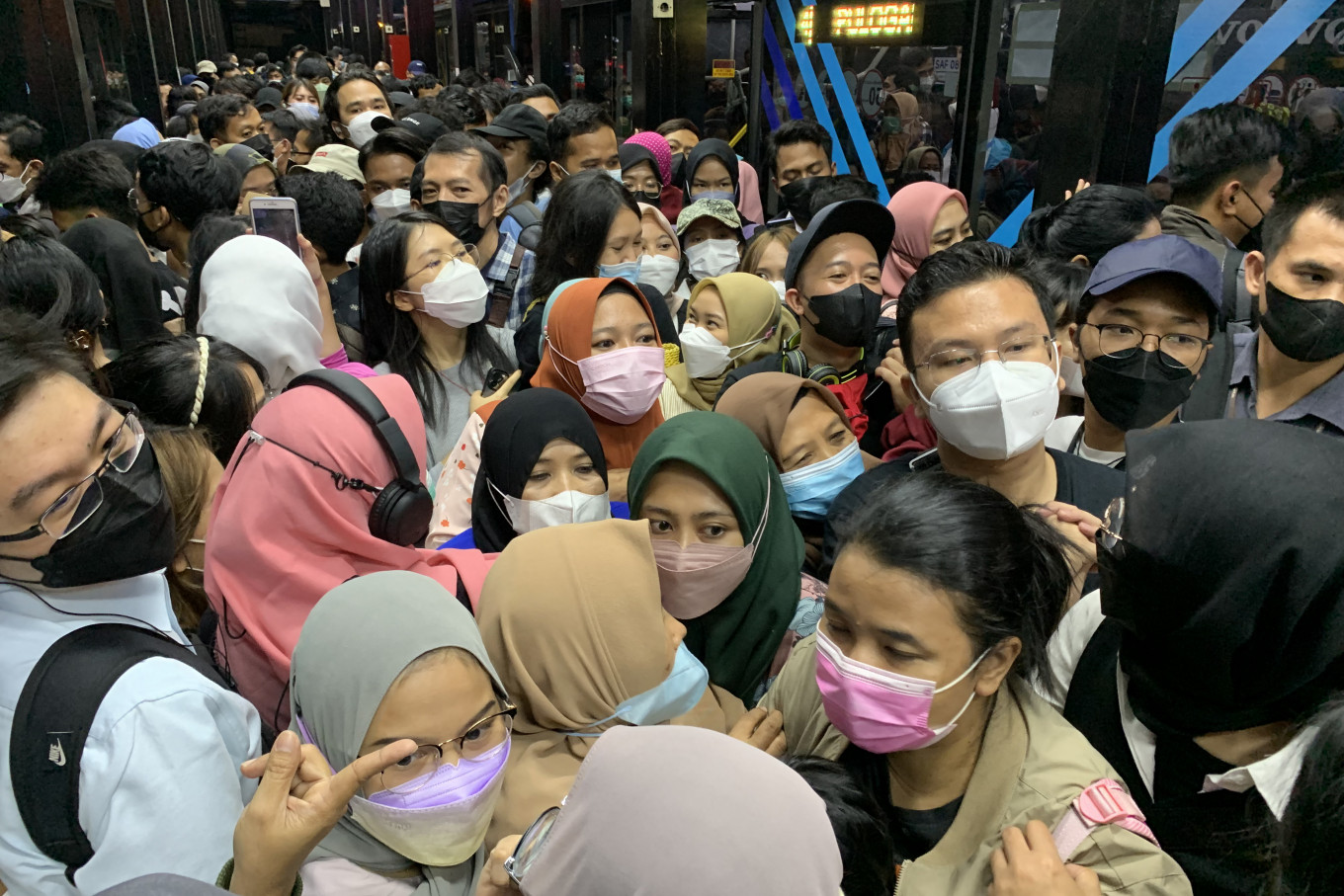Popular Reads
Top Results
Can't find what you're looking for?
View all search resultsPopular Reads
Top Results
Can't find what you're looking for?
View all search resultsGovernment revokes stricter COVID-19 curbs in Greater Jakarta
Change text size
Gift Premium Articles
to Anyone
T
he government has backtracked on its decision to tighten curbs in Greater Jakarta, only a day after raising the level of public activity restrictions (PPKM) in Indonesia's epicenter of COVID-19.
Home Minister Tito Karnavian signed a ministerial instruction on Monday declaring Jakarta and its satellite cities to be under PPKM level 2 from Tuesday to Aug. 1. The region had been under PPKM Level 1 – the least stringent of the four-tiered curbs – since the end of May.
The decision to tighten curbs in Greater Jakarta came as the country began seeing a significant uptick in COVID-19 transmissions as a result of the rapid spread of the highly contagious Omicron subvariants BA.4 and BA.5.
Home to more than 20 million people, Greater Jakarta was the epicenter of the last COVID-19 wave, contributing to roughly half of Indonesia's new coronavirus cases.
On Wednesday, however, Tito issued another ministerial instruction declaring that Greater Jakarta would return to PPKM level 1 until early next month, effectively negating his previous policy.
Under PPKM level 2, offices, houses of worship, shopping malls, public facilities, movie theaters and hotels are allowed to operate at 75 percent of capacity while wedding venues are permitted to host events at 50 percent capacity. PPKM level 1 allows those establishments to operate at full capacity.
Home Ministry Regional Administration Development Director General Safrizal Z.A said the decision to revoke Monday's ministerial instruction had been account of the government's strong belief that Greater Jakarta had passed the peak of the current wave of COVID-19 infections.
"Even though — based on epidemiological assessments — Greater Jakarta falls under level 2 of COVID-19 community transmission, we are starting to see the curve flattening, indicating that the area has passed the peak of the current wave of infections. We believe that Greater Jakarta will return to level 1 community transmission in a week or two," Safrizal said in a statement on Wednesday.
"Considering the flattening of cases, low COVID-19 hospitalizations and deaths in the region, ongoing economic recovery efforts and the fact that the curbs will be effective for a month, we decided to revise our previous policy and place Greater Jakarta under PPKM level 1."
Hotspot
COVID-19 cases in Jakarta seemed to have hit a plateau in the past weeks, with weekly new case numbers decreasing by 5 percent; from 7,930 cases on June 19-25 to 7,490 cases on June 26-July 2.
Daily new cases also gradually declined between Friday to Monday; from 1,100 cases to 737 cases.
The improving trend, however, did not last long, as on Tuesday, the capital recorded its highest daily infections since March, with 1,274 new cases. On Wednesday, the number rose to 1,516 new confirmed cases.
The spike and eased curbs have sparked concerns over an exponential surge of COVID-19 transmissions in Greater Jakarta, especially considering the country's low vaccination rate and increased public mobility during the upcoming Idul Adha (Day of Sacrifice) holiday.
By Wednesday, the country had administered 370 million primary doses to 63 percent of the population, which means it has the second-lowest vaccine coverage in Southeast Asia.
Indonesia also has the fourth-lowest booster shot coverage among ASEAN countries, with only about 24 percent of the targeted 208 million people having received their third jabs.
After Idul Fitri and Idul Adha last year, between May and July of 2021, Indonesia saw a significant rise in COVID-19 infections that was sparked by the rapid spread of the Delta variant.
In the three-month period, confirmed infections rose from 153,000 cases to more than 1 million.
Epidemiologist Dicky Budiman of Griffith University has criticized the government's PPKM flip flop, arguing that it might increase public distrust of authorities' COVID-19 policies.
"To build public trust in government policies, authorities need to create strict, clear and consistent epidemiological indicators. Risk communication is a key component of public health interventions during an outbreak. A poor risk communication strategy would decrease the effectiveness of the government's policies and reduce the public's willingness to actively participate in limiting the spread of the disease," Dicky said.










